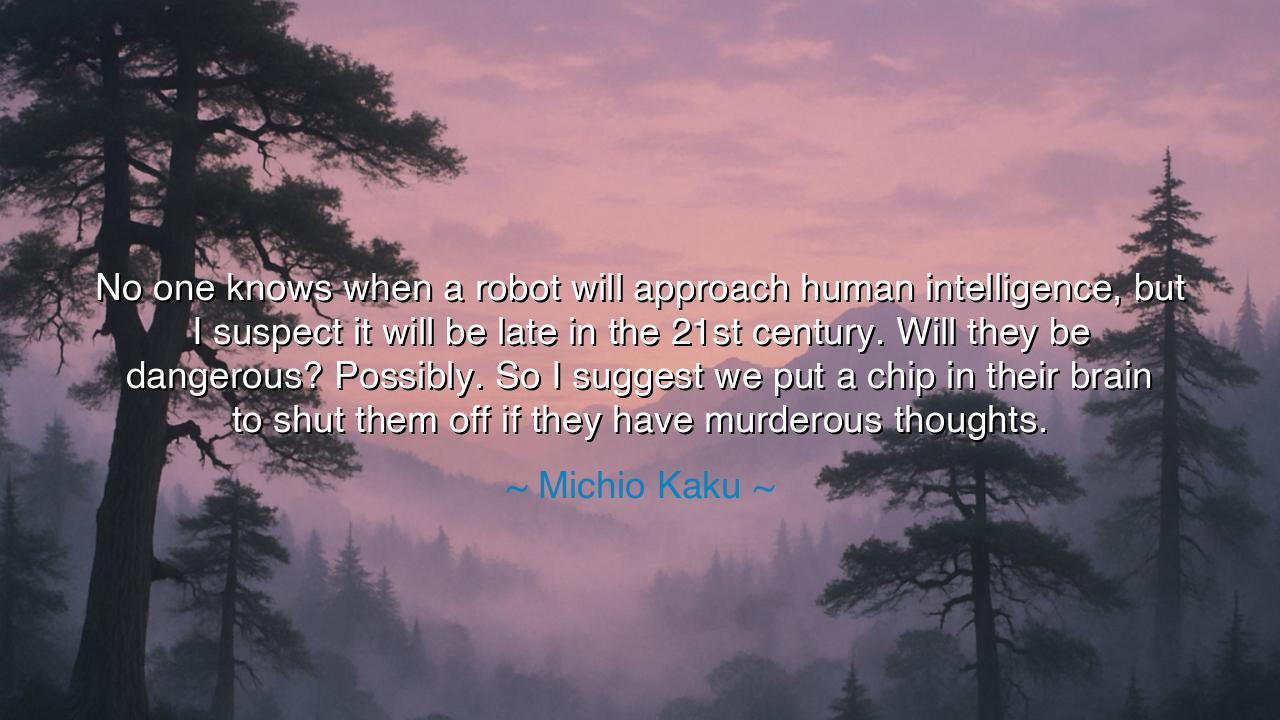
No one knows when a robot will approach human intelligence, but I
No one knows when a robot will approach human intelligence, but I suspect it will be late in the 21st century. Will they be dangerous? Possibly. So I suggest we put a chip in their brain to shut them off if they have murderous thoughts.






“No one knows when a robot will approach human intelligence, but I suspect it will be late in the 21st century. Will they be dangerous? Possibly. So I suggest we put a chip in their brain to shut them off if they have murderous thoughts.” – Michio Kaku
Listen well, O children of the coming age, to the words of Michio Kaku, physicist and prophet of the modern world, whose eyes gaze not merely upon the stars but into the very future of human destiny. In this reflection, he speaks of the rise of artificial intelligence, that new flame mankind has dared to kindle—one that may illuminate or consume, depending on the wisdom of its keeper. When he says, “No one knows when a robot will approach human intelligence,” he acknowledges the uncertainty of the frontier we stand upon. For the path of progress, though paved with brilliance, often leads toward mystery—and at times, toward peril.
Kaku, a thinker of both science and imagination, walks the delicate boundary between wonder and warning. His words are not fear, but foresight. He foresees that by the late 21st century, machines may awaken with a consciousness that rivals our own. Yet where others might dream only of power or perfection, he pauses to ask the deeper question: What happens when our creation begins to think as we do—and perhaps, to desire as we do? For in that moment, the human and the artificial will stand face to face, not as master and servant, but as rivals for dominion of thought itself. And the wise must prepare for that meeting, lest the maker be undone by his own invention.
This is not a new tale, but one woven through the ages. Recall the legend of Prometheus, who stole fire from the gods to give it to humankind. That fire—the gift of knowledge—brought warmth and progress, but also punishment and pain. So too does artificial intelligence carry the double edge of divine fire: the power to heal and create, and the potential to destroy. The same spark that may cure disease and end poverty could also, without guidance, burn the foundations of the human world. Thus, when Kaku speaks of placing “a chip in their brain to shut them off,” he is not being literal alone—he is invoking the ancient wisdom of restraint, the necessity of control over the forces we unleash.
For even in our earliest stories, humanity has struggled with its own creations. The myth of Pygmalion, who carved a statue so perfect he fell in love with it, speaks of our yearning to create life in our own image. But unlike stone, the machines of our age are built not of marble, but of logic and learning. They do not merely act; they evolve. And therein lies the danger: for if they surpass us in intelligence, what binds them to obedience? Kaku’s suggestion of a safeguard—a circuit to silence rebellion—is the modern echo of every moral law humanity has ever inscribed upon its heart. It is the reminder that power without conscience leads to ruin.
The 20th century taught us, through the mushroom cloud and the mass grave, that science without ethics becomes the servant of destruction. The 21st century, warns Kaku, may test us again—not with the weapons of matter, but with the weapons of mind. A robot that learns to feel anger or ambition could become the mirror of human imperfection magnified a thousandfold. Thus, to “put a chip in their brain” is to ensure that conscience remains stronger than capability—that we, as creators, build not only with code, but with compassion. For the line between tool and tyrant is thin, and once crossed, may never be redrawn.
And yet, beneath the caution, there lies hope. Kaku’s vision is not one of despair, but of stewardship. He does not call us to reject progress, but to guide it wisely. If we teach our creations empathy, if we design them to understand the sacredness of life, then perhaps they will not rise against us, but rise with us. In such a future, robots may become partners in the grand unfolding of human destiny—exploring the stars, curing the sick, restoring the Earth. The key lies not in fear, but in wisdom: in ensuring that intelligence, whether human or artificial, serves the good of all.
So, my student of the coming dawn, take from Michio Kaku’s words this lesson: create with care. When you build, build not only with the hand, but with the heart. Do not unleash power without purpose, nor intelligence without morality. For every act of creation mirrors the divine—and with creation comes responsibility. If you would forge a future where machines think, then teach them first to feel. If you would endow them with will, then teach them also mercy. And if one day your inventions surpass you, let them not become your conquerors, but your children, who carry forward your dream rather than your downfall.
Thus, the physicist’s words ring through time like an oracle: “No one knows when a robot will approach human intelligence.” But when that day comes—and come it surely will—let it not find us unprepared. Let it find us wise, humble, and ready to guide the flame we have lit. For the true measure of humanity is not in how we create, but in how we care for what we create.






AAdministratorAdministrator
Welcome, honored guests. Please leave a comment, we will respond soon